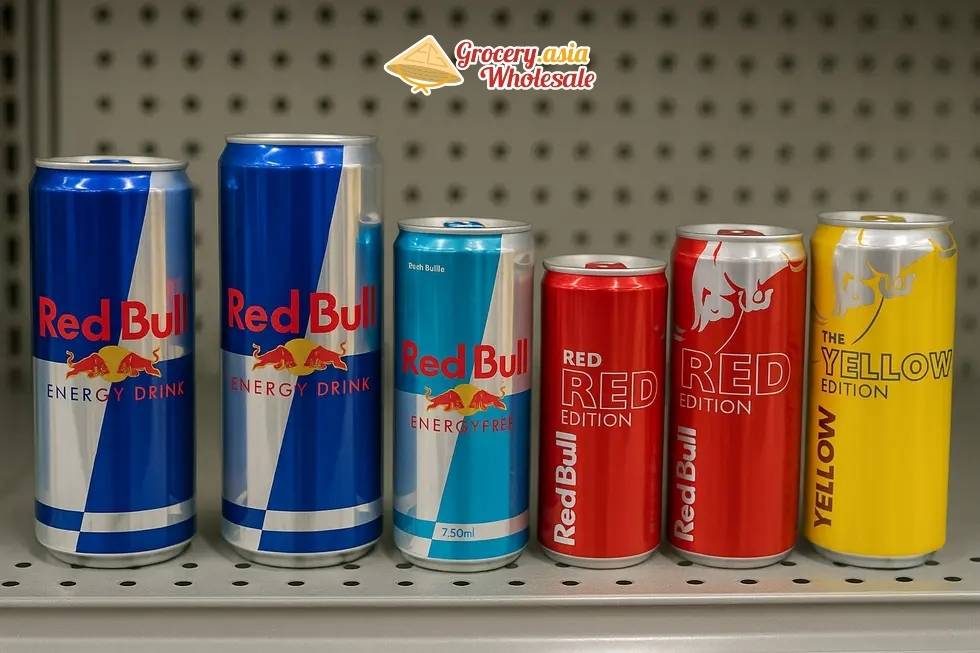No products in the cart.
Beverages News, Energy Drinks, Red Bull Energy Drink
Red Bull Wholesale Insights: Navigate the Bulk Energy Drink Market
Acquiring Red Bull energy drinks in bulk presents a unique opportunity for wholesale importers aiming to meet the rising demand for this renowned beverage. With insightful market dynamics, intricate pricing structures, logistical hurdles, and diversified offerings, navigating this domain requires a comprehensive understanding. This article will guide you through essential market insights, uncover pricing tactics, address logistical challenges, explore product diversification, and evaluate international trade considerations to ensure a successful wholesale venture in Red Bull energy drinks.
Table of Contents
Navigating the Competitive and Diverse Red Bull Wholesale Market
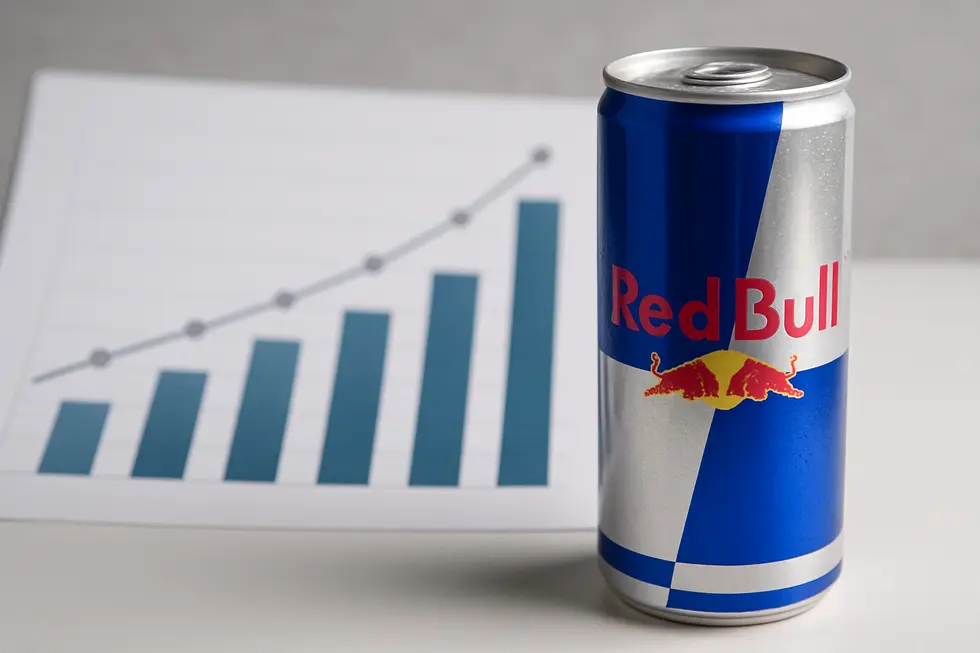
The Red Bull energy drink wholesale market is a bustling ecosystem fueled by intense competition, diverse consumer preferences, and innovative distribution strategies. Competition within this space is robust, as major entities like Red Bull strive to outpace rivals by continually enhancing product offerings. The introduction of sugar-free and new flavor variants caters to the health-conscious consumer, meeting the growing demand for healthier options.
Consumer trends are steering towards “better-for-you” beverages, with a particular appeal to younger demographics who appreciate products that align with their health and lifestyle values. This evolving preference significantly influences the wholesale dynamics, prompting suppliers to adapt swiftly to these changes by stocking an array of product variations.
Distribution channels are equally influential, with traditional retail chains such as supermarkets playing a pivotal role in high-volume sales. However, the rise of e-commerce is altering how Red Bull products are accessed, especially in rapidly digitalizing markets like India. Meanwhile, the Middle East presents a burgeoning wholesale scene, propelled by increased consumer demand and trade activities via strategic hubs such as Jebel Ali Port.
Understanding these dynamics is crucial for stakeholders aiming to thrive in the Red Bull wholesale market. For further insights into Jebel Ali Port’s regional trade impact, visit the Middle East wholesale dynamics resource.
Unlocking the Economics of Red Bull Wholesale Pricing
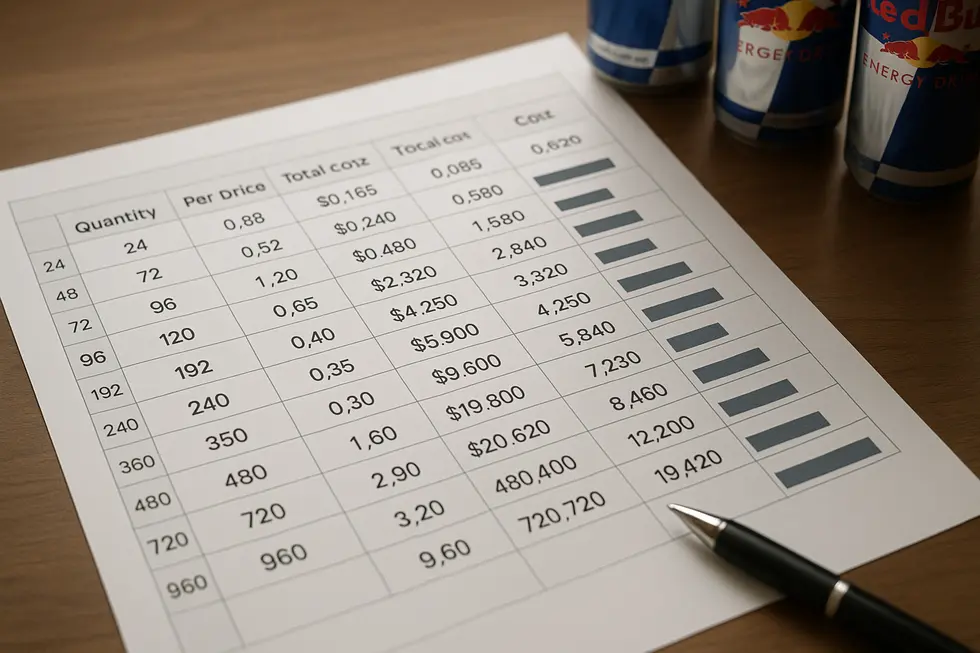
Analyzing the pricing structures for Red Bull energy drinks in the wholesale market unveils the intricate dance between volume-based discounts and market competition dynamics. Wholesale buyers benefit significantly from volume discounts, where the unit price decreases as the order size grows. Suppliers, such as Eurovan Trading, offer attractive discounts on bulk purchases, creating a pathway for buyers to expand profit margins while fostering beneficial supplier relationships through tailored payment and logistics options.
The landscape is further molded by intense market competition, particularly from major industry players challenging each other over brand positioning and pricing strategies. This bustling environment necessitates a balanced approach, considering both consumer value perception and competitive pricing, ensuring that pricing strategies are sustainable and align with market expectations. Importantly, startups often struggle here by relying solely on cost-plus pricing, potentially misaligning with consumer expectations.
Adding to the complexity are distribution-related fees and minimum order requirements. For example, warehouse retailers like Costco showcase how promotional discounts invariably come tied with minimum purchase thresholds, influencing pricing frameworks. Therefore, wholesalers must adeptly navigate these elements, maintaining their competitiveness in a market favored by strategic discounting and expertly managed logistics. This competency is particularly pivotal for those dealing with international shipping, as noted in our detailed analysis of Red Bull’s international expansion.
In essence, success in the Red Bull wholesale market demands a strategic blend of dynamic pricing, logistical savvy, and a keen understanding of market competition.
Navigating the Maze of Red Bull Wholesale Logistics

The logistical intricacies involved in Red Bull energy drink wholesale demand a meticulous approach. Ensuring the transport and storage conditions are consistent with Red Bull’s quality requirements is pivotal. This encompasses maintaining precise temperature and humidity settings, a crucial factor for product integrity, both in warehousing and during transit.
Another challenge lies in efficient packaging and handling. Proper palletizing, using shrink-wrap, and adhering to international labeling standards helps mitigate damage. Ensuring products are shelf-ready upon arrival not only preserves their quality but also enhances their appeal to retailers.
Freight management presents its own set of hurdles. Coordinating shipments across diverse international ports with competitive rates requires strategic partnerships with leading shipping lines. This ensures swift and reliable distribution routes, especially critical for regions like the Gulf countries where demand remains high.
Inventory management paired with demand forecasting is another complex beast to tackle. Implementing robust systems that offer real-time visibility into stock levels and leveraging predictive algorithms can significantly aid in preventing supply chain disruptions.
Finally, the intricacies of order processing and fulfillment cannot be overlooked. It demands precision and transparency across all stages, from inquiry to delivery, to meet diverse client requirements seamlessly.
Strategies such as positioning warehouses strategically and integrating advanced environmental controls play a critical role in addressing these logistical challenges. If effectively managed, these logistical facets ensure that Red Bull distributors can achieve timely deliveries and maintain the high standards expected of this energy drink brand.
For those interested in broader transportation strategies and innovations, exploring resources like eco-friendly energy drink packaging can offer further insights into sustainability practices within the industry. Opting for innovative solutions not only enhances logistical operations but also aligns with the growing demand for environmentally responsible practices.
Red Bull’s Strategic Product Diversification: Catering to a Health-Conscious Market
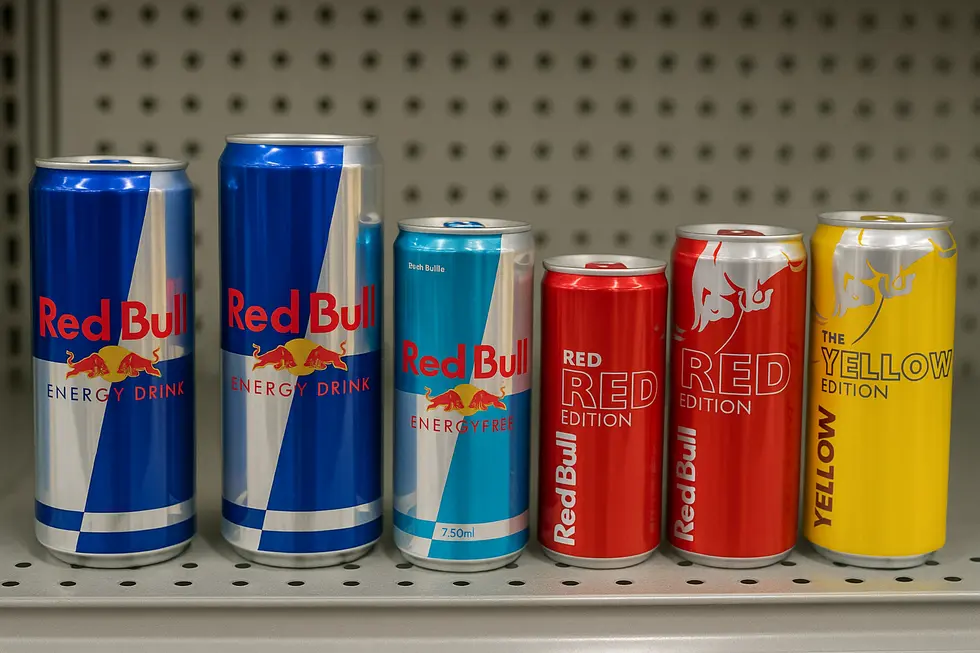
In the competitive world of energy drinks, Red Bull has adeptly diversified its product offerings to meet evolving consumer needs and preferences. While its classic formula remains beloved globally, the brand has introduced several new products that augment its appeal to a broader audience. One of the key strategies has been the development of health-conscious formulations, aligning with the global shift towards wellness and healthier living.
By leveraging natural ingredients and reducing sugar content, Red Bull addresses the demands of a health-oriented consumer base. Many of these offerings, such as the Ice Edition, are enriched with B-group vitamins like niacin, pantothenic acid, and B12, offering additional functional benefits beyond energy stimulation. These ingredients target consumers seeking products that bolster focus and help manage stress, while still delivering the iconic Red Bull boost.
Red Bull’s emphasis on innovative market positioning reflects a forward-thinking approach. The company invests in environmentally friendly packaging and experimental flavors, resonating with younger, more conscious consumers. This dynamic approach not only helps Red Bull maintain its dominant market position but also sets it apart as a leader intent on sustainability and health.
Furthermore, by introducing sugar-free and low-sugar options, Red Bull positions itself favorably against competitors. While brands like Monster Beverage Corporation explore diversification into other drink categories, Red Bull remains focused on energy-driven functional variants. This tight focus supports its identity as an energy drink leader, appealing to a global audience that continues to demand authenticity alongside innovation.
For further insights, visit Red Bull Vietnam’s export strategy and their adaptations in product formulations.
Navigating the Complex Landscape of Global Trade in Red Bull Wholesale
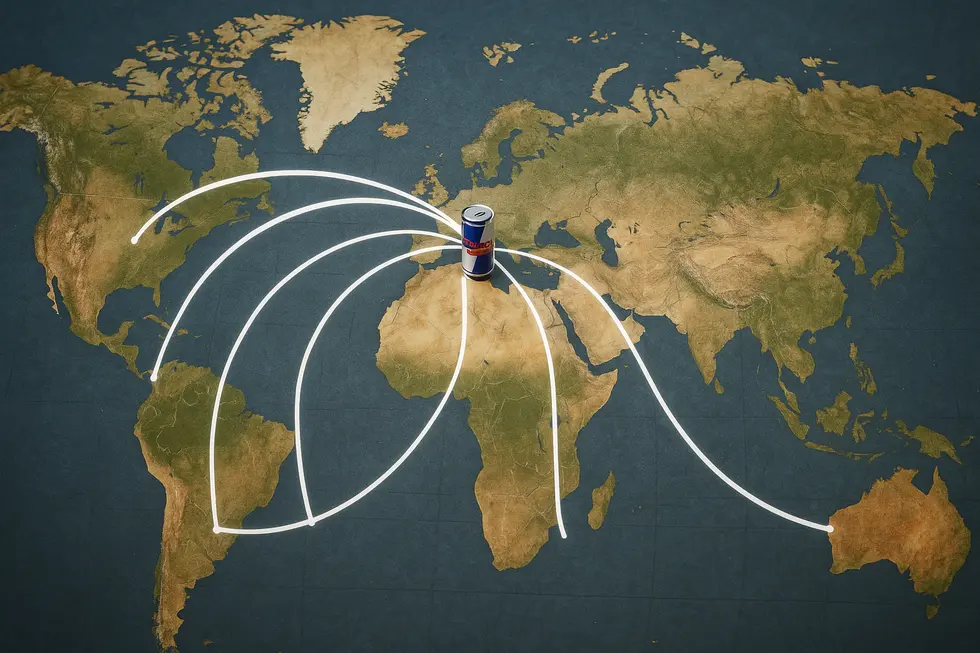
For businesses entering the realm of Red Bull energy drink wholesale, understanding the intricacies of international trade and regulatory frameworks is essential. Operating across various global markets, wholesalers must secure all necessary import/export licenses tailored to each region’s legal requirements. An Egyptian company, for example, takes proactive steps by holding essential registrations and permits for exports to Gulf countries, paving the way for seamless trade.
Ensuring compliance with logistics and shipping standards is crucial. Proper packaging and labeling must align with international norms to preserve product quality and meet destination country requirements. This often involves collaborating with reputable freight partners to guarantee punctual deliveries to pivotal ports like Jebel Ali in the UAE or King Abdulaziz Port in Saudi Arabia.
Moreover, wholesalers must be vigilant about the regulatory standards governing energy drinks in different countries. Countries may vary widely in their regulations on caffeine content, labeling, and other food safety criteria, which wholesalers need to adhere to before distribution.
Understanding market-specific tariffs, customs duties, and taxes forms the backbone of a sound pricing strategy. In a landscape where Red Bull is in over 170 countries, keeping abreast of local regulations ensures a robust market presence.
A comprehensive grasp of these elements not only facilitates market entry but also strengthens compliance and brand consistency across regions. For more insights into wholesale energy drink trends, explore the bulk energy drink market insights.
Final thoughts
Engaging in Red Bull energy drink wholesale offers substantial opportunities for importers, but success is contingent upon understanding market dynamics, implementing strategic pricing, overcoming logistical barriers, leveraging product diversification, and navigating international trade complexities. By harnessing these insights, you can position your business effectively in this competitive sector.
👉 Source Red Bull energy drink in bulk with confidence. Inquire now for competitive pricing and global delivery options.
About us
Asia Grocery Co., Ltd is a trusted distributor, wholesaler, and exporter of fast-moving consumer goods (FMCG) from Vietnam, backed by over 20 years of expertise. We deliver authentic products from globally recognized brands such as P&G, Unilever, Redbull, Coca-Cola, Pepsi, Asiadeli, along with traditional and culturally significant Asian products, catering to customers worldwide with a special focus on Vietnamese and Asian communities abroad.

